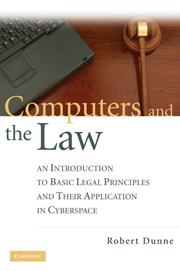Book contents
- Frontmatter
- Contents
- PREFACE
- ACKNOWLEDGMENTS
- 1 THE COMMON LAW AND STATUTORY LAW
- 2 CONTRACTS
- 3 TORTS INTRODUCTION
- 4 DEFAMATION
- 5 THIRD PARTY LIABILITY
- 6 COPYRIGHTS
- 7 TRADE SECRETS
- 8 TRADEMARKS
- 9 THE RIGHT OF PRIVACY
- 10 E-MAIL
- 11 THE RIGHT OF PUBLICITY
- 12 CONSTITUTIONAL LAW
- 13 PORNOGRAPHY AND OBSCENITY
- 14 ADVERTISING AND SPAM
- 15 JURISDICTION
- AFTERWORD
- INDEX
10 - E-MAIL
Published online by Cambridge University Press: 05 June 2012
- Frontmatter
- Contents
- PREFACE
- ACKNOWLEDGMENTS
- 1 THE COMMON LAW AND STATUTORY LAW
- 2 CONTRACTS
- 3 TORTS INTRODUCTION
- 4 DEFAMATION
- 5 THIRD PARTY LIABILITY
- 6 COPYRIGHTS
- 7 TRADE SECRETS
- 8 TRADEMARKS
- 9 THE RIGHT OF PRIVACY
- 10 E-MAIL
- 11 THE RIGHT OF PUBLICITY
- 12 CONSTITUTIONAL LAW
- 13 PORNOGRAPHY AND OBSCENITY
- 14 ADVERTISING AND SPAM
- 15 JURISDICTION
- AFTERWORD
- INDEX
Summary
Introduction
The question of e-mail privacy tends to arise most frequently in the workplace setting, and that is where we will look at it. We will concentrate primarily on issues related to employer monitoring of e-mail.
The first question, then, is what level of privacy in general can employees expect?
E-Mail: Case 1
O'CONNOR ET AL. v. ORTEGA
No. 85-530
SUPREME COURT OF THE UNITED STATES
480 U.S. 709; 107 S. Ct. 1492; 94 L. Ed. 2d 714; 1987 U.S. LEXIS 1507; 55 U.S.L.W. 4405;
42 Empl. Prac. Dec. (CCH) P36,891; 1 I.E.R. Cas. (BNA) 1617
October 15, 1986, Argued
March 31, 1987, Decided
JUDGES: O'CONNOR, J., announced the judgment of the Court and delivered an opinion in which REHNQUIST, C. J., and WHITE and POWELL, JJ., joined. SCALIA, J., filed an opinion concurring in the judgment. BLACKMUN, J., filed a dissenting opinion, in which BRENNAN, MARSHALL, and STEVENS, JJ., joined.
OPINION: O'CONNOR, Justice:
This is a 5–4 USSC decision that addresses the question of what sort of expectation of privacy an employee has.
This suit under 42 U. S. C. § 1983 presents two issues concerning the Fourth Amendment rights of public employees. First, we must determine whether the respondent, a public employee, had a reasonable expectation of privacy in his office, desk, and file cabinets at his place of work.
- Type
- Chapter
- Information
- Computers and the LawAn Introduction to Basic Legal Principles and Their Application in Cyberspace, pp. 238 - 254Publisher: Cambridge University PressPrint publication year: 2009



